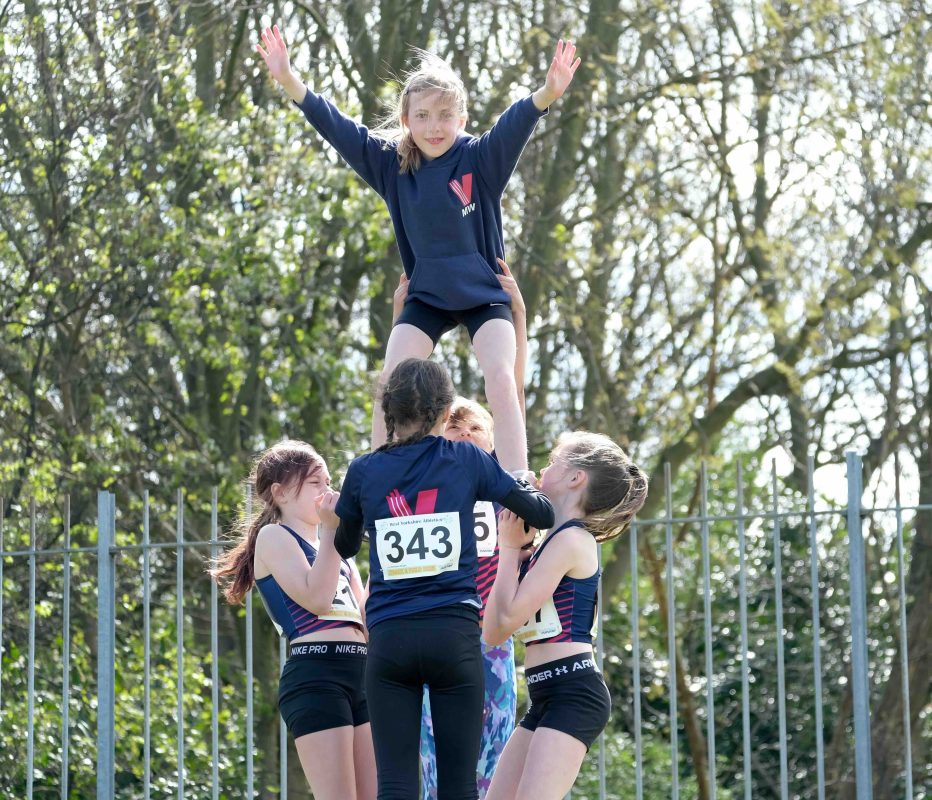Yesterday marked the first meet of the West Yorkshire Track and Field League series for 2025. For my daughter, like many young athletes facing first-time athletics competition, it brought understandable nerves.
Whilst many of our young athletes have cross-country experience, track and field athletics presents unique pressures: the feeling of being individually watched, the vulnerability of competing alone, and the technical uncertainties of starts and jumps. Thought of moments like these can trigger anxieties and fear of failure, but rising to the challenge of a new and unfamiliar competition format can also build confidence, improve self-esteem and develop valuable skills for life.
I am a strong believer these kind of positive outcomes from competition are facilitated by the attitudes and behaviours of parents, coaches, officials, volunteers, clubs and event promoters. The West Yorkshire Track and Field League does a fantastic job of providing structured but relaxed competition that serves as a great introduction to track and field athletics for young people in our region.
Nonetheless, to a ten-year-old girl, the prospect of a first-time track and field ‘competition’ is daunting and something that needs to be carefully managed.
Recognising the potential for overwhelming competition pressure, our club, Vale of York Athletic Community, deliberately focuses on cultivating a supportive team environment. Our goal is not merely to prepare our athletes for events, but to nurture connections and foster well-being – a priority echoed by national charities like the Youth Sport Trust, who work to improve children’s lives through sport.
We encourage our team members to build friendships through play, offer mutual support during training, allow them to voice their concerns and aspirations, and to focus on camaraderie and caring rather than competition so they can look out for each other, especially when nerves come to the fore.
I was so pleased to see the fruits of this approach at yesterday’s meet at Thornes Park, Wakefield. In particular, our Under-11 girls were a joy to watch. Their enjoyment of the event from 10am start to 4pm finish was emblematic of the whole team’s.
The girls embraced every event on offer with enthusiasm and a positive ‘we-got-this’ attitude. At the start of the day, the 600 metres was an insurmountable challenge for all but two of them. They were just not prepared to take the distance on. But by the end of the day, the youngest team member, Daisy, had rallied the others with a cry of, “We’ll do it for the team!”, and all of them had given it a go.
This kind of powerful team spirit, forged from strong bonds of friendship, shifts the focus from individual exposure to collective strength.
The photograph above captures a spontaneous moment of play between events. Five girls having fun, creating a cheerleading pyramid on the grass beside the track. It shows physical support, but also represents the emotional scaffolding they provided for each other throughout the day.
Their support networks were visible everywhere: in the easy friendships, the shared trips to the tuck shop for sweets and crisps, the constant chatter, and the way they stood at the sidelines after their own races to cheer teammates on.
It was a special day for me to witness this positive dynamic, carefully nurtured beforehand, shine so strong in the sunshine of the meet itself. The supportive atmosphere resonated beyond our team; we received numerous comments from others remarking on the girls’ infectious enthusiasm and the genuine warmth of their support for one another. There were no tears, no obsessions over performances, PBs, and positions.
While athletics obviously does involve a strong element of individual performance, its true value for our children should lie beyond the stopwatch and finish line. Ensuring your coaching philosophy is grounded on holistic development – focusing on relationships, character, and intrinsic enjoyment – creates a far richer and more sustainable experience than one solely driven by results.
I was lucky in my youth to have a coach that reflected these value in his own school coaching practice. In recent years, I have learned of ‘transformational coaching’, as championed by Joe Ehrmann’s InSideOut Initiative, that has as its primary concern developing character through sport and a healthy coach-athlete relationship, rather than a ‘transactional’ focus on winning.
Similarly, Ken Reed and other writers and advocates involved with organisations like the League of Fans advocate a shift away from ‘ego’-driven, win-at-all-costs mentalities that have taken over many youth sports. Instead they want to foster the ‘soul’ of sport – enjoyment, sportspersonship, and connection.
When as coaches we prioritise creating positive memories, fostering friendships, and celebrating participation itself (like impromptu cheerleading or shared snacks), we nourish this ‘soul’ of sport. Ultimately, this focus inspires young athletes to stay involved in our sport for longer, and look forward to rather than fear the next competition..

